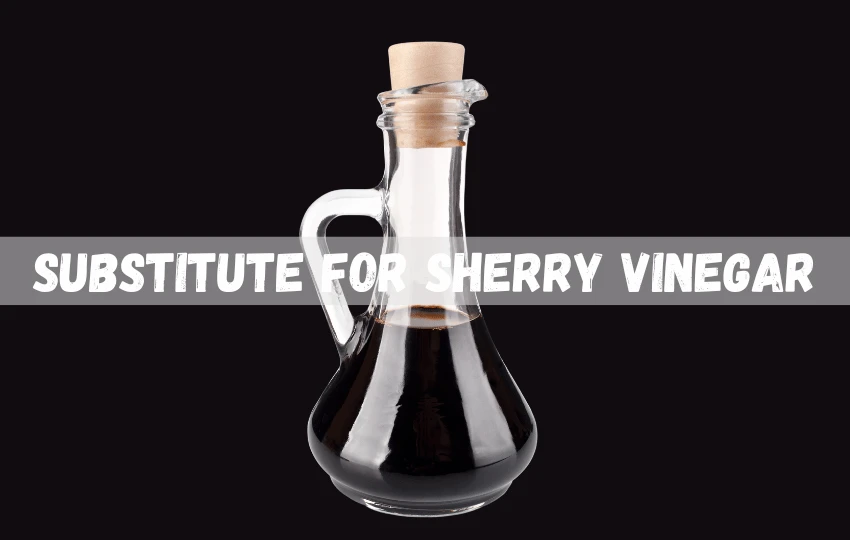Are you a home cook or a culinary enthusiast who loves to experiment with different flavors and ingredients in the kitchen?
Then you must know about the versatility of sherry vinegar.
Its unique tangy, nutty, and slightly sweet flavor adds complexity and depth to any dish it is added to. But what happens when you don’t have sherry vinegar on hand?
Don’t worry! In this post, we will explore 13 ideal substitutes for sherry vinegar that are readily available and can be used in a pinch.
In short, " What can I use instead of sherry vinegar?" Red Wine Vinegar, Champagne Vinegar, Apple Cider Vinegar, Rice Vinegar, Lemon Juice, Balsamic Vinegar, White Wine Vinegar, Tamarind Paste, Lime Juice, Tomato Juice, Rice Wine Vinegar, Tarragon Vinegar, and Sherry Wine.
What is sherry vinegar, and what does sherry vinegar taste like?
The Sherry vinegar is a wine vinegar made from the same base as Spanish sherry wines. It has a deep, intense flavor that combines tartness and sweetness.
The flavor of sherry vinegar also has nutty, fruity undertones, which make it great for adding depth and complexity to sauces, dressings, marinades and other dishes.
Sherry vinegar pairs well with olives, mushrooms and oily fish like salmon or mackerel.
Its sweet-tart characteristics also make it great for deglazing pans after searing meats such as steak or pork chops for an added layer of flavor.
Uses of sherry vinegar
Sherry vinegar is a versatile and flavorful ingredient used in different forms in cooking and food preparation. Here are some common uses of sherry vinegar:
1. Salad dressings: Sherry vinegar can be used as the primary acid in salad dressings, adding a tangy, complex flavor to vinaigrettes and other dressings.
2. Marinades: Sherry vinegar can be used as a key ingredient in marinades for meat, poultry, and seafood, adding flavor and helping to tenderize the meat.
3. Sauces: Sherry vinegar can be used as a base for sauces, such as beurre blanc or Hollandaise sauce, to add a tangy depth of flavor.
4. Pickling: Sherry vinegar can be used in pickling solutions for vegetables, adding a tangy and slightly sweet flavor to the final product.
5. Sautéing: Sherry vinegar can be used to deglaze pans and add flavor to sautéed vegetables and meats.
6. Soups and stews: Sherry vinegar is added to stews and soups to add depth of flavor and acidity.
7. Baking: Sherry vinegar can be used as an ingredient in baked goods, such as bread or pastries, to add a tangy flavor and help activate the yeast.
Overall, sherry vinegar is a versatile ingredient that can add a complex and unique flavor to a wide range of dishes. Its tangy and slightly sweet flavor profile makes it a popular choice in many cuisines around the world.
Where to buy sherry vinegar?
If you’re searching for where to buy sherry vinegar, there are a few different places you can go. Many specialty food stores carry it, as do some international grocery stores.
You can also order online from many retailers that provide a variety of diverse flavors and types of sherry vinegar.
Best substitutes for sherry vinegar with measurement
1. Red Wine Vinegar

Red wine vinegar is an excellent alternative to sherry vinegar. It has a similar tangy and fruity taste that can give a boost of acidity to sauces, marinades, and dressings.
Ratio or measurement: Use an equal amount of red wine vinegar for the amount of sherry vinegar required in the recipe.
2. Champagne Vinegar
Like sherry vinegar, champagne vinegar has a mild, delicate flavor and is perfect for dressings or sauces. Its subtle yet bright acidity makes it a great alternative.
Ratio or measurement: Use an equal amount of champagne vinegar for the amount of sherry vinegar required.
3. Apple Cider Vinegar
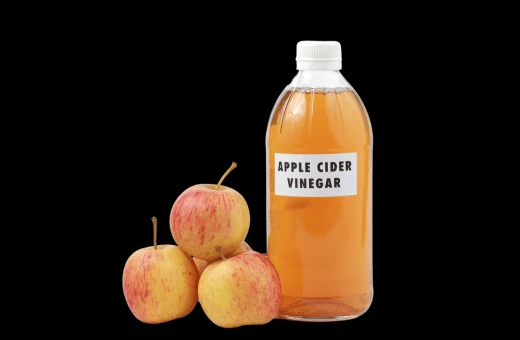
Apple cider vinegar has a little sweet and fruity taste that can make a great substitute for sherry vinegar, especially in recipes that require a touch of sweetness.
Ratio or measurement: Use an equal amount of apple cider vinegar for the amount of sherry vinegar required.
4. Rice Vinegar
If you’re looking for a milder vinegar, try rice vinegar. This has a subtle sweetness and a delicate flavor that can be used as a sherry vinegar replacement.
Ratio or measurement: Use an equal amount of rice vinegar as a substitute.
5. Balsamic Vinegar
Balsamic vinegar has a thick and tangy flavor that is an option for sherry vinegar in marinades and dressings.
Ratio or measurement: Use half the amount of balsamic vinegar required in the recipe, as it can be quite strong.
6. Lemon Juice
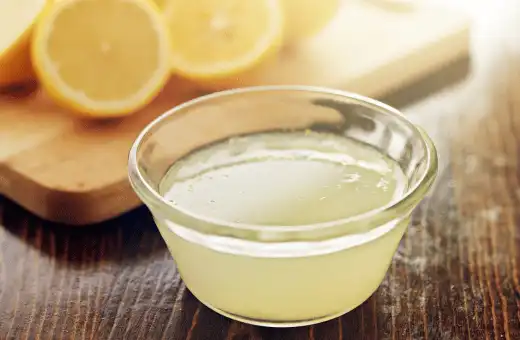
Lemon juice can add a bright burst of acidity to any dish and can be used instead of sherry vinegar in a pinch.
Ratio or measurement: Use three times the amount of lemon juice as a substitute for sherry vinegar.
7. White Wine Vinegar
White wine vinegar has a soft, slightly acidic flavor that can bring a tangy and fruity taste to various dishes.
Ratio or measurement: You can use an equal amount of white wine vinegar as a replacement.
8. Tamarind Paste
Tamarind paste is an excellent substitute for sherry vinegar, especially in recipes that require a sweet and tangy taste.
This has a bold and tangy flavor that can add depth to any dish.
Ratio or measurement: Use an equal amount of tamarind paste for the amount of sherry vinegar required.
9. Lime Juice
Lime juice can add a fresh and citrusy taste to any dish and can be used as a substitute for sherry vinegar. It has a bright acidity that can enhance the flavor of dressings, sauces, and marinades.
Ratio or measurement: Use three times the amount of lime juice as a replacement for sherry vinegar.
10. Tomato Juice
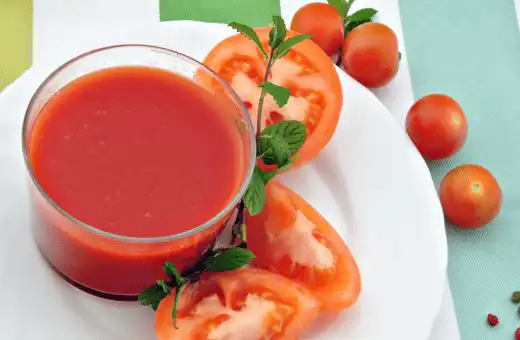
Tomato juice is an excellent substitute for sherry vinegar in recipes that require a slightly sweet and tangy taste.
It has a refreshing acidity and a subtle sweetness that can bring out the flavors in your dish.
Ratio or measurement: Use an equal amount of tomato juice for the amount of sherry vinegar required.
11. Rice Wine Vinegar
Rice wine vinegar is another great substitute for sherry vinegar if you’re looking for something with a mild and fruity flavor.
This vinegar is frequent in Asian cuisine, making it ideal for dishes like stir-fries, marinades, and salad dressings.
12. Tarragon Vinegar
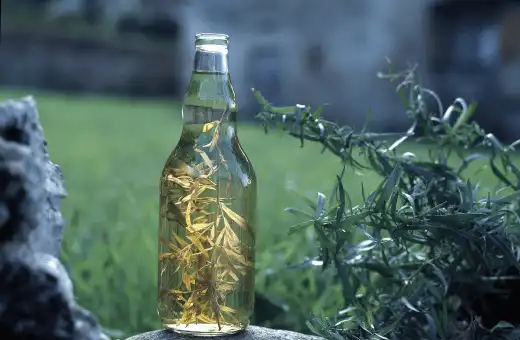
Tarragon vinegar is a subtly flavored vinegar that can be used as a sherry vinegar replacement. It has a mild taste and can add a sweet and acid edge to your dressings, sauces, and marinades.
13. Sherry Wine
You can use sherry wine in place of sherry vinegar. This is vital to note that you should reduce the quantity by half as it contains a higher level of alcohol and sweetness.
You can expect a sweeter and fruitier flavor profile.
Substitute for sherry vinegar in gazpacho
1. Red Wine Vinegar
Red wine vinegar has a sharp, acidic flavor that is similar to sherry vinegar but with a lighter body and less sweetness.
Its fruity characteristics make it an ideal alternative for gazpacho, as it will provide the same bright acidity as sherry vinegar but with more subtle notes of berry and currant.
2. Champagne Vinegar
This light and fruity vinegar has a mild acidity that makes it perfect for adding flavor to dishes without overpowering them.
While not quite as complex as sherry vinegar, champagne vinegar still provides a nice balance of sweet and tart in gazpacho while enhancing its overall flavor profile.
3. White Balsamic Vinegar
This kind of vinegar is made from white grapes, which give it a sharp yet slightly sweet taste that pairs well with the tomatoes and other vegetables in gazpacho.
It’s also less intense than red balsamic or sherry vinegar, so you can easily adjust the amount you use to get the desired balance of flavors.
4. Apple Cider Vinegar
Apple cider vinegar has been utilized as a cooking ingredient for centuries because of its unique tartness and its capacity to bring out the flavor of other ingredients in dishes like gazpacho.
Its light apple notes also make this an excellent substitute for sherry vinegar if you’re looking for something a bit fruitier than the traditional option.
5. Rice Wine Vinegar
Rice wine vinegar has a delicate yet flavorful taste that is reminiscent of sherry without being overly acidic or bitter.
It’s usually sweeter than other types of vinegar, making it perfect for adding depth to gazpacho without overwhelming the dish’s other flavors.
non-alcoholic substitute for sherry vinegar
1. Rice Vinegar
Rice vinegar is a mild-flavored vinegar made from fermented rice. It has a little sweet taste that can be used in place of sherry vinegar for salad dressings, marinades, and sauces.
2. Apple Cider Vinegar
Apple cider vinegar is a type of vinegar made from the fermentation of apple juice, and it has a little sweet and tart taste that is ideal for substituting sherry vinegar.
It works well in marinades, salad dressings, and sauces and can add a subtle fruity flavor to your dishes.
3. White Wine Vinegar
The White wine vinegar is made from white wine that has been fermented into an acidic liquid with a mildly sweet flavor profile that complements other ingredients without becoming overpowering.
It makes an excellent substitute for sherry vinegar in dressings and marinades as it adds complexity without competing too heavily with the other flavors in the dish.
4. Balsamic Vinegar
Balsamic vinegar is derived from grapes which are cooked down to create an intensely flavored syrup before being aged over several years in wooden barrels to develop its unique flavor profile.
The result is a tart yet complex flavor that can be used to replace sherry vinegar in many recipes, such as vinaigrettes and sauces.
5. Lemon Juice
Lemon juice is often used as a choice for sherry vinegar due to its sour taste and bright acidity, which adds depth of flavor to many dishes without overpowering other ingredients or making them overly sweet like some vinegar can do when added in large quantities.
Substitute for sherry vinegar in French onion soup
Suppose you are searching for a substitute for sherry vinegar in French onion soup. In that case, consider using red wine vinegar.
Red wine vinegar has a tart, slightly sweet flavor that can help balance out the savory and rich flavors of the soup.
Red wine vinegar also helps bring out the sweetness of the caramelized onions, which is one of the signature features of French onion soup.
When substituting red wine vinegar for sherry vinegar, it’s best to start off with a lower amount than you would sherry vinegar and then adjust it as needed according to your tastes.
You may also consider using balsamic or white wine vinegar as possible substitutes as well.
Substitute for sherry vinegar in baking
In baking, sherry vinegar can be substituted with white balsamic vinegar or apple cider vinegar. White balsamic vinegar has a slightly sweeter and milder taste than sherry vinegar and is best used in light cakes, muffins, and other desserts.
Apple cider vinegar is negligibly less acidic than sherry vinegar and has a more mellow flavor. It is excellent for adding an extra layer of complexity to cookies, pies, cakes, and other baked goods.
When substituting either of this vinegar for sherry vinegar in baking recipes, it may be necessary to make some little adjustments to the recipe – such as reducing the amount of sugar or liquid added – to achieve the right balance of flavors.
Substitute for sherry vinegar in salad dressing
A great substitute for sherry vinegar in salad dressing is white wine vinegar. White wine vinegar has a softer, more delicate flavor than sherry vinegar and won’t overpower a salad.
It’s also slightly less acidic than sherry vinegar, which can make this easier to balance the flavors of the dressing.
Other alternatives include balsamic vinegar, red wine vinegar, or even apple cider vinegar.
Whatever you choose, be sure to modify the amount used to taste in order to achieve the desired flavor profile for your dressing.
What is the difference between sherry vinegar and white vinegar?
The main difference between sherry vinegar and white vinegar is the flavor. Sherry vinegar is made from sherry wine, whereas white vinegar is typically made from distilled alcohol.
As a result, sherry vinegar has a richer flavor that’s slightly sweet with hints of nuttiness, while white vinegar tends to be more sour and astringent.
Sherry vinegar also tends to have a deeper color than that of white vinegar.
In terms of uses in cooking, both types can be utilized for pickling vegetables or adding acidity to dishes; however, due to their sweeter notes and milder finish, sherry vinegar is often preferred for dressings and marinades.
Conclusion on substitute for sherry vinegar
In conclusion, there are many ideal substitutes for sherry vinegar that you can use in your cooking.
Red wine vinegar, champagne vinegar, apple cider vinegar, rice vinegar, balsamic vinegar, lemon juice, white wine vinegar, tamarind paste, lime juice, and tomato juice are all excellent options that can add a unique flavor to your dishes.
Just remember to adjust the quantities according to the recipe and your taste preference, and you’ll be able to create flavorful and delicious dishes every time. Happy cooking!
FAQs on substitute for sherry vinegar
Q1. What is similar to sherry vinegar?
Sherry vinegar is similar to other types of wine vinegar, like red or white wine vinegar, balsamic vinegar, and champagne vinegar. However, it has a unique flavor profile thanks to the oak barrels used in aging the sherry.
The taste of sherry vinegar is typically more complex than other types of wine vinegar and can range from sweet to tangy. Additionally, when compared to balsamic or champagne vinegar, which has stronger flavors, sherry vinegar is more mellow with a slightly fruity taste.
Q2. What vinegar is closest to sherry vinegar?
The type of vinegar that is closest to sherry vinegar is balsamic vinegar. This has a distinctive sweet and sour flavor, similar to sherry, and can be used in many of the same ways as sherry vinegar.
However, unlike sherry vinegar, which is made from a white grape variety, balsamic vinegar is made from grapes such as Trebbiano, Lambrusco, or Ancellotta that have been cooked into a thick syrup before being fermented and aged in wooden barrels for several years.
This process results in a complex flavor profile filled with notes of molasses, plum, figs, and raisins. Balsamic vinegar is also higher in sugar content than sherry vinegar due to the aging process; this makes them ideal for creating rich sauces, drizzling over salads or vegetables, or adding an extra layer of flavor to marinades and glazes.
As with other types of vinegar, it’s important to opt for a high-quality balsamic vinegar that is aged for a min of 10 years. The darker, thicker varieties will have the richest flavor and are best suited for cooking. So if you’re looking for a substitute for sherry vinegar, try using some high-quality balsamic instead! It may just become your favorite kitchen staple!
Q3. Can I use apple cider vinegar rather than sherry vinegar?
Yes, you can use apple cider vinegar rather than sherry vinegar. Although both kinds of vinegar are made from fermented alcohol, apple cider vinegar is made from apples and has a pleasant, tangy flavor that is slightly sweet.
Apple cider vinegar also contains more vitamins and minerals than sherry vinegar, including potassium, magnesium, iron, and calcium. Additionally, it has acetic acid, which gives it its tart flavor, as well as antibacterial properties that may be beneficial to health.
Q4. Can red wine vinegar substitute for sherry vinegar?
Yes, red wine vinegar can be used as a substitute for sherry vinegar. Red wine vinegar is made from the same base ingredient—wine—as sherry vinegar, but the flavor profile differs slightly. Red wine vinegar has a sharper and more acidic taste than sherry vinegar, which is generally somewhat milder and sweeter.
The difference in flavor profile means that when substituting red wine vinegar for sherry vinegar, it’s best to adjust the other ingredients so that they complement the stronger taste of the red wine variety. For instance, if you’re using them both in a salad dressing recipe, you may want to add an extra pinch of sugar or even some honey to mellow it out. Additionally, if using them both in baking recipes, you may need to reduce the additional acid used to achieve a balanced result.

